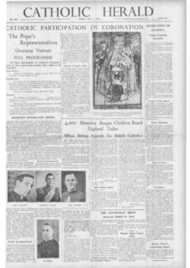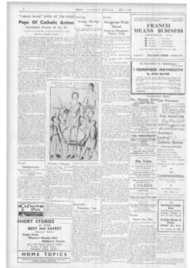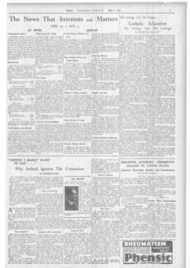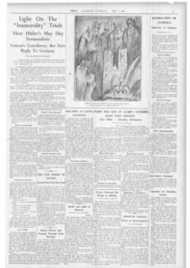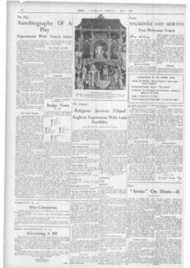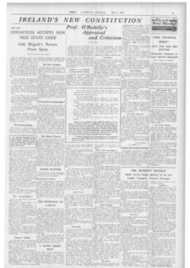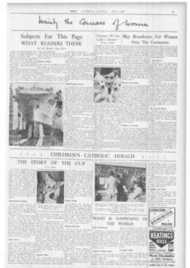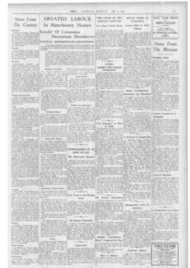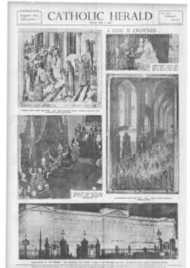Page 14, 7th May 1937
Page 14

Report an error
Noticed an error on this page?If you've noticed an error in this article please click here to report it.
Tags
Share
Related articles
News From
The Letter Competition
In A Few Words
'we Are Not Remote Subjects'
Miss A. Coogan
SWEATED LABOUR In Manchester Homes
Scandal Of Coronation Decorations Manufacture
NATIONAL CONFERENCE OF LABOUR WOMEN
The shameful conditions under which home workers in Manchester and elsewhere had been making Coronation decorations were described and roundly condemned by the National Conference of Labour Women which concluded last week.
Mothers from special areas where unemployment has long been prevalent described their experiences; attacks were made on the policy of local governments of building huge blocks of flats; and a re,sylution was passed deploring " discrimination" against women workers shown by the Government in the new Widows', Orphans', and Old-age Contributory Pensions (Voluntary Contributors) Bill. This " discrimination," it was contended, had no regard for the responsibilities of the individual but was proposed merely on grounds of sex. The proposal called on the Minister of Health to withdraw this section of the hill and substitute a new one establishing an equal income limit for men and women.
Abolition of Overtime
Mrs. A. Sherman, of Bridgend, said that one ot the things which would help to reduce unemployment in the distressed areas would be the abolition of all overtime work. Protesting against the enforced transference of juveniles, she said that the young people had no desire to leave their homes, which resulted in breaking up family life in many of these areas.
" I want to make a plea also that something should be done for the unemployed who are between fifty and sixty years of age," added Mrs. Sherman. " My man is reaching this age, and when he goes to the colliery to ask for work they say to him, ' Don't you mean that it's a convalescent home you want and not work?' You who live outside the distressed areas may sympathise with us, but you cannot possibly realise what is taking place in our mining areas and what we are going through."
"This Black Misery"
Mrs. Barbara Ayrton Gould. of London, speaking as a member of the Labour Special Areas Commission, said that there was no reason why this black misery which was going on among hundreds of thousands of men, women, and children should be endured.
It was simply due to the unthinking people in the rest of the country who would not force the hands of the Govertunent. If one-hundredth part of what was being spent upon armaments was put into the distressed areas to set them on their feet there would be no black areas.
" Reasonable " Houses
Mrs. Lily Thomas (Manchester) moved a resolution, which was carried, condemning the policy advocated by local government authorities of building huge blocks of flats under the Slum Clearance Act and urging the Government to increase the subsidy for the purpose of building houses of a reasonable standard.
" We don't want these great blocks of flats — we want houses," declared Mrs. Thomas. "Too long has it been argued that we want to live near our work. We don't. We want to get right away from it into the fresh air, and if wages were increased it would enable us to afford to live away in the fresh air and there could be no question of building these huge blocks of flats instead of houses."
Mrs Thomas spoke of flats in which the wash.houses were placed on the top floor and women were obliged to climb four storeys with their washing.
Mrs. Barnacott (Manchester) said that one of the reasons why she condemned flats was because they led to immorality among young people, who were herded together arid unable to get away from one another.
Exploitation of Home Workers
What was described as the exploitation of women " home " workers, particularly as regards the making of Coronation goods was condemned by Mrs. Lily Thomas (Manchester).
In Manchester, she said, there were women sitting all day making quilts for which they were paid at the rate of sixpence for three hours' work. These quilts were sold at good prices in the shops. There was also a cheaper kind of quilt for which the women were paid at the rate of fourpence for three hours' work.
There were women, too, who made wash-leather dusters sold for sixpence in the shops. The women were paid 4+d. a gross.
" The greatest exploitation of all, not only in Manchester but in other large towns as well," she added, " is the home sweating in connection with the making of Coronation favours and decorations. Hundreds of women and girls who are making flags and favours are paid only 3d. a gross for them (Cries of ' Shame.') We ought to condemn and boycott Coronation favours and decorations made under these conditions."
Inquiry A resolution was passed requesting the Standing Joint Committee of Industrial Women's Organisations to set up an inquiry into the conditions and wages for out-work from factories, with a view to pressing for legislation to establish a minimum standard.
Mrs. Arnold Gray (Rutland and Stamford), speaking of poverty endured by many land workers, said that in her village hunters and hounds were housed better than farm workers and their families. Mrs. Gray, herself a farmer's wife, described the poverty in her district as " absolutely appalling." There were in the country great tracts of land that should be scheduled as " very distressed." The farm labourer was a skilled man. yet his average wage was only about 30s. to 35s. a week.
Land Workers
Every week for the last three years, she said, wives of agricultural workers had written to her asking for the loan of a small loaf, a pound of tea. and a pound of sugar " as it is Thursday and my money has given out."
" A few weeks ago," she said, " I made a survey of sixty farm labourers' cottages. Only one family was having fresh milk. All the others were forced to use cheap tinned milk. Yet all the husbands of these women attended cows and one father of a family living on tinned milk was employed milking forty cows a day." (Cries of "Shame.")
Deaths from Malnutrition Mrs. Gray declared that children were dyihg in country districts from the worst forms of malnutrition. One mother told her that her eight-year-old daughter died of pernicious anwmia. The doctor had told her to give the child butter, cream, eggs, and milk, and the mother's reply was, " How could 1, as an agricultural worker's wife, give my little girl these necessities? I had to watch he die."
Farm workers, added Mrs. Gray, were being driven off the land. If war came the country would need them, hut they could not make skilled agricultural workers in forty-eight hours.
The delegates passed a resolution viewing with great concern the inadequate wages of agricultural workers, protesting against the low standard of life to which land workers and their families were forced, and urging the need of focusing public attention on the matter.
blog comments powered by Disqus


